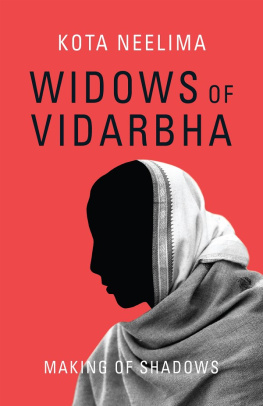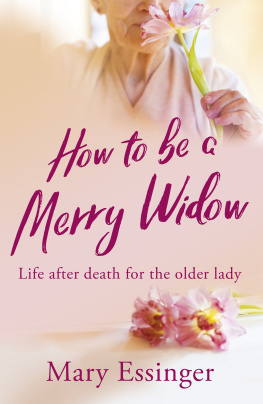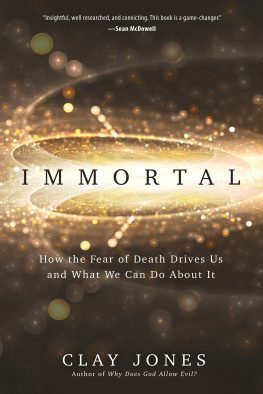WIDOWS OF VIDARBHA
WIDOWS
OF
VIDARBHA
Making of Shadows
KOTA NEELIMA


Oxford University Press is a department of the University of Oxford.
It furthers the Universitys objective of excellence in research, scholarship,
and education by publishing worldwide. Oxford is a registered trademark of
Oxford University Press in the UK and in certain other countries.
Published in India by
Oxford University Press
2/11 Ground Floor, Ansari Road, Daryaganj, New Delhi 110 002, India
Kota Neelima 2018
The moral rights of the author have been asserted.
First Edition published in 2018
All rights reserved. No part of this publication may be reproduced, stored in
a retrieval system, or transmitted, in any form or by any means, without the
prior permission in writing of Oxford University Press, or as expressly permitted
by law, by licence, or under terms agreed with the appropriate reprographics
rights organization. Enquiries concerning reproduction outside the scope of the
above should be sent to the Rights Department, Oxford University Press, at the
address above.
You must not circulate this work in any other form
and you must impose this same condition on any acquirer.
ISBN-13 (print edition): 978-0-19-948467-6
ISBN-10 (print edition): 0-19-948467-8
ISBN-13 (eBook): 978-0-19-909363-2
ISBN-10 (eBook): 0-19-909363-6
Typeset in Bembo Std 11/15
by The Graphics Solution, New Delhi 110 092
Printed in India by Replika Press Pvt. Ltd
To
Pawan
Contents
| APL | Above Poverty Line |
| BPL | Below Poverty Line |
| Bt | Bacillus thuringiensis |
| CAG | Comptroller and Auditor General of India |
| gm | Gram |
| ICDS | Integrated Child Development Services |
| ITI | Industrial Training Institute |
| MPSC | Maharashtra Public Service Commission |
| NABARD | National Bank for Agricultural and Rural Development |
| NCRB | National Crime Records Bureau |
| NOTA | None of the Above |
| PAC | Public Accounts Committee |
| PTA | Part-Time Attendant |
| RBI | Reserve Bank of India |
| SBI | State Bank of India |
| SDO | Sub-Divisional Officer |
| VJAS | Vidarbha Jan Andolan Samiti |
| VNSSM | Vasantrao Naik Sheti Swavlamban Mission |
One early winter morning I found myself in a small room of a half-built house in a village in Yavatmal district where a farmer had committed suicide the year before. The morning light came in from the open front door and there was a faint fragrance of hay from the cattle shed. A just-lit wood stove gave off smoke that smelled of a familiar tree. The room held the father, mother, and brother of the deceased farmer. I said I wanted to speak to the wife, which turned out to be an unexpected request. She was busy, with two children to send off to school, food to cook for the family, and errands to run before she went to work as farm labour at Rs 100 per day. When I finally got a chance to talk to her, she answered my questions in a guarded, measured manner; but whenever her responses were simple and direct, she was impatiently interrupted by her family members. When I asked about her life after her husbands death, the sunlight from the open door reflected in the unshed tears of her brown eyes. The men answered on her behalf, and I told them that I wanted her version. Abruptly, she stood up and left the room, and I wondered if I had probed too far. The men explained that she did not know anything about what killed her husband and that there was no point in asking her questions.
Giving up, I decided to leave, when she returned carrying two cups of tea. She handed one teacup to her surprised father-in-law and the other to me. A confused silence reigned in the room as if she did not have the authority to decide whether or not to serve tea to guests. Then, she settled in her corner and began speaking about her life in her own waysimply and directly. No one interrupted her again.
It was the best tea I ever had.
* * *
There can be no generalization, even for the sake of a preface, about the women of Vidarbha. Each of them had a story of grief and torment of living in poverty in India. Each time they spoke, it was in a voice unused to expression. Their grief and tears swept away every claim of the greatness of this nation. Each time they asked a question, they silenced every compelling speech by our political leaders. And these were simple questions: What will happen to my children? Why does no one care for us? Why am I so unfortunate?
The women I followed since 2014 led me on a journey into a land of shadows. They lived in the undefined space left by the men of the society. They were considered physically weak, socially redundant, and electorally insignificant. They were colonized peripheries, whose lives were at the disposal of men to do as they pleased. This was how this nation was built: by relegating the woman behind the man, glorifying her sacrifice in that overused saying that behind every man, there must be a woman.
I learnt they did not compare themselves to men, they did not consider themselves equals. So they did not deal with men, and their reluctance was considered feminine and made men feel protective towards them. When the men died, the women lost their only access to the world; they needed a male escort to go to panchayat offices, tehsil offices, banks, krishi kendras, even their childrens schools. They told me they would not be allowed. I later understood what that meant. One of the widows faced intense social backlashmainly from her own familywhen she single-handedly managed to get approval for a house loan, under a 2016 government scheme. Another woman, who found financial independence because of employment through the government in 2007, was advised to remarry as she had only daughters, but no sons.
These womens spirits were tamed every day in a continuous exercise of control over their choices and freedom. Forced to walk a few paces behind the man, like his shadow, the woman did not exist without him. But when he died, he left his shadow behind.
The woman, however, may be the best part of the man. One rainy day in 2015, a mother of several children living in a mud-and-thatch house said that her husband had loved her. She knew that it did not explain his suicide, which left her alone to handle the consequences and the distress, but she said it for the children. She wanted him to be honoured and remembered by them, and praised his efforts to help the family.
The children also knew what killed their fathers and shackled their mothers to their circumstances. I would often ask them about their dreams for future, and only one said agriculture. The children imagined being professionals, artistsone, even a businessmanbut their aim was respect, not wealth; no one said they wanted to be rich. Many wanted to be part of the state system, so that they could bring justice for others like them and make it more humane and responsive. These children were witnesses to the states neglect of their fathers when they were alive, and, the harsh investigation after their deaths. Their anger cannot be reconciled; they know the state could have saved their fathers, just as it could now support their mothers.
Next page











